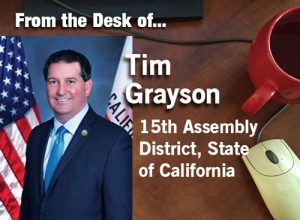Bills would boost manufacturing, limit bank ‘junk fees’
 CONTRA COSTA COUNTY, CA (Oct. 1, 2024) – Every two years, the California Legislature convenes for a two-year legislative session and gets to work to address issues that matter most to Californians.
CONTRA COSTA COUNTY, CA (Oct. 1, 2024) – Every two years, the California Legislature convenes for a two-year legislative session and gets to work to address issues that matter most to Californians.
On Aug. 31, the Legislature dispensed with all pending legislation and adjourned for the final time of this session. I sent 15 bills to the governor’s desk this year, and I’d like to highlight some of the legislation I’m most proud of:
Assembly Bill 52
This represents a multi-year effort I’ve led to spur new investment in our manufacturing industry. While spending time in our community, I’m sure you often cross paths with women and men in the manufacturing field. Manufacturing employs 1.3 million people in California, and here in the Bay Area, manufacturing supports nearly 300,000 jobs with an average salary of $88,500.
A unique aspect of this field is that each manufacturing job supports at least 2.5 others in the economy, with some subsectors, such as aerospace, supporting as many as eight or nine more jobs.
California is undoubtedly a global hub for innovation and technology, however, from 2020-’22 our state attracted less than 1% of the country’s manufacturing investments. My bill AB 52 incentivizes long-term investments and growth in California’s manufacturing industry by providing qualified entities a state tax credit equal to what they pay in local sales tax for manufacturing equipment.
I’m determined to bring manufacturing investment back to California and encourage a “live here, build here” reality, and it is my hope that the governor will sign my bill into law.
AB 2017
Over the last decade, the banking industry has been rife with “fee creep,” the gradual and growing use of questionable fees often charged to those consumers who least can afford them. These “junk fees” are often disproportionate to the actual cost of providing a service to a consumer, and banks and other financial institutions have increasingly relied on them to increase their profits.
This year, I authored AB 2017 to rein in a particular type of junk fee known as nonsufficient fund (NSF) fees. This fee is assessed on a consumer who has a transaction declined right away, in real time, due to not having enough money in their accounts. Banks should not be charging consumers fees for transactions that are declined right away, and if my bill is signed into law, this practice will be stopped in California and financially vulnerable consumers will be protected from charges that they cannot afford.
AB 2663 and AB 3012
As a licensed general contractor, I know that time is money, and that unclear building timelines and fees can stop a construction project before it even begins. As I’ve done each year I’ve served in the Assembly, this year I again authored legislation to help bring more transparency to the home development process.
AB 2663 would require local agencies to annually post the amount that was collected in certain fees and how specifically those fees were later spent in a project. AB 3012 would require a city or county to create a fee estimate tool that the public can use to calculate an estimate of fees for a proposed housing development project.
Increasing transparency helps us to streamline new development and, ultimately, help us achieve our goal of building our way out of California’s housing crisis.
If you would like to learn more about legislation I’ve authored this year or to discuss other matters important to you, please connect with me through my Concord district office at 925-521-1511.
